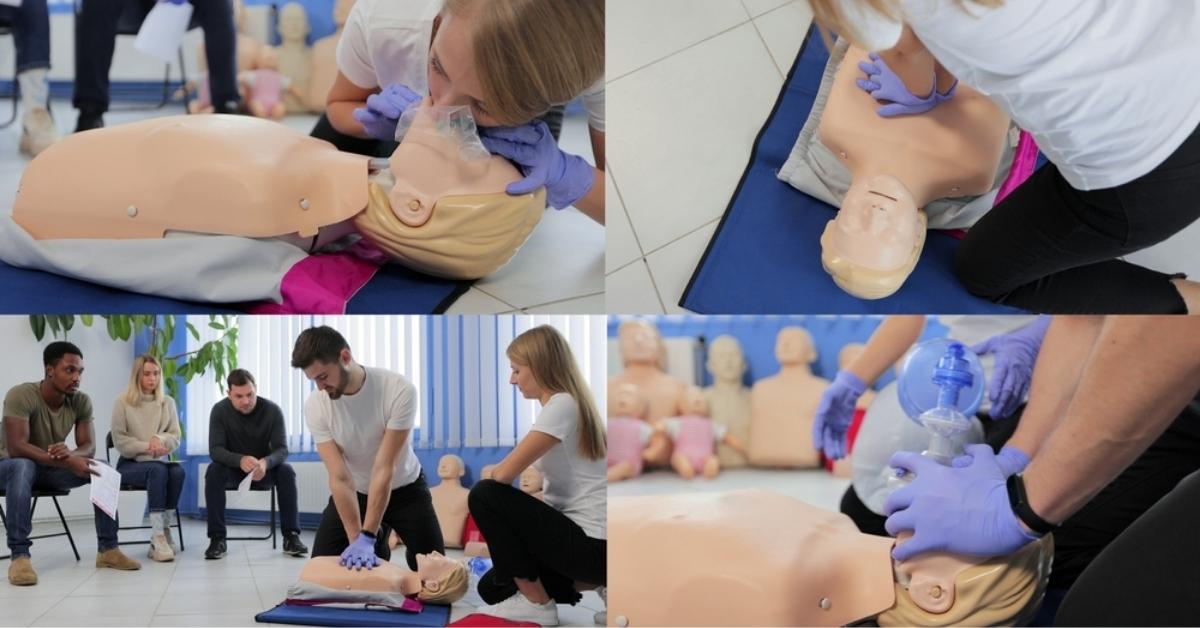Individuals who complete a diploma in paramedical courses are transformed into allied healthcare workers. Paramedics provide direct patient care, rehabilitation, therapy, diagnostics, and health promotion initiatives to help patients regain their minimally optimum functioning.
Paramedical diploma courses list in Agra, Uttar Pradesh is career-oriented. These develop the learners’ abilities in accordance with the requirements of the healthcare business.
Why Choose a Career in Paramedicine?
- Due to the rise of the healthcare business, a diploma in paramedical courses provides several work options. This is true not just in PAN India, but also in other parts of the world.
- These are career-oriented courses that develop an individual student into a qualified healthcare practitioner.
- Certificate and diploma programs provide speedier and more affordable entry into the healthcare business.
- Due to the pandemic’s expansion, an increasing number of competent and certified paramedics are necessary to bolster the healthcare industry’s backbone.
- Career advancement and opportunities are many and diverse, making it a lucrative alternative.
- In India, the number of trained and qualified paramedics in various disciplines and specialties remains low. As a result, the need for a diploma course in paramedical in Agra, Uttar Pradesh is increasing.
- If you want to make a difference in someone’s life, then enrolling for a diploma in paramedical science study to become a paramedic may be a wise decision.
- It is both a tough and rewarding career. No two patients are the same, and no two days are alike.
- It provides an opportunity to interact with individuals from different walks of life.
After Completion, the Paramedics’ Role
DPMI is providing the best diploma paramedical courses in Agra, Uttar Pradesh because paramedics are a vital part of the medical system, assisting physicians in diagnosing, treating, and delivering medical care to unwell or injured persons. This includes, but is not limited to, reporting, recordkeeping, supply management, and infection control.
- They provide drugs orally or by intravenous injections.
- They provide assistance during surgical operations such as the insertion of a breathing tube.
- They are trained to administer cardiopulmonary resuscitation using a defibrillator or shock device.
- They aid in the administration of first aid and the treatment of wounds and injuries.
- They provide education to patients and their families.
- Patients are rehabilitated by paramedics.
- They supervise laboratories or clinics and aid in illness diagnosis through the use of blood tests, X-rays, MRI, CT scans, and ultrasound, among other diagnostic tools.
- They work as technicians/pharmacists, operating medical equipment and reading results such as the electrocardiogram (ECG).
Levels of Paramedical Education
- Program of certification
- Diploma programmes
- Advanced Certificate
- S. in paramedical sciences
- Coursework for a master’s degree in paramedical sciences
- Doctoral programmes
After finishing a paramedical training, the paramedical team works at a hospital.
Here are 5 Brilliant Tips for Diploma in Paramedical Courses
Look Over The Syllabus For The Paramedical Course You Want To Take
If you’re unsure which course to take, looking over some of the issues and topics covered in the course will help you decide. The subjects and topics covered will help you judge the course’s complexity to some level. You will be able to comprehend not only the difficulty, but also the nature of the course and the area of specialization in which you will be trained and qualified after graduation.
For example, students studying B.Sc. Ophthalmic Technology learn about the fundamentals and principles of the eye, its ailments, and the many treatments for those diseases and illnesses. In the meantime, the Bachelor of Physiotherapy programmes prepares students to treat a variety of muscle-related ailments and disorders. Despite the fact that both are paramedical specializations with 4-4.5 year programmes, graduates of one will not be able to assist in medical procedures relevant to the other. In other words, these are specialized courses that are designed to train students in a single area of specialization.
Recognize Your Advantages And Disadvantages
One of the most crucial aspects of choosing a course is to consider one’s own skills and shortcomings. The strengths and weaknesses mentioned here apply to your academic strengths and limitations. This is one of the places where the preceding point comes in handy, because the students will be able to determine if there are any themes or topics with which they are unfamiliar.
Now, one cannot choose a course solely on the basis of their strengths; each course will have subjects, issues, and activities that may be tough for the students to complete. As a result, when choosing a course, your course strengths should outnumber your course disadvantages.
Pursue Your Passions
Your hobbies and passion for a course or subject, as corny as it may sound, will have an impact on how your career develops in the long term. Keep in mind that pursuing one’s passion and following one’s interests are two different things. While hobbies can help you choose between many paths, passion is what will keep you satisfied in the long term.
However, if one wishes to keep themselves happy while pursuing a profession in their chosen field, it is always important to follow one’s passion. As a result, before deciding on a paramedical specialty, consider whether a career in that profession would pique your interest in the long run.
Examine Your Job Prospects
The main reason for choosing a technical or professional education is the course’s job possibilities. At the end of the day, every young person will be obliged to live alone at some point, which will necessitate them earning a living in order to live comfortably.
Checking the employment prospects of the paramedical courses of interest is thus a recommended approach of narrowing down the options. Career prospects do not refer to job options after graduation, but rather to opportunities for professional and personal growth within the area. While paramedical courses may offer similar job opportunities, each course will be unique.
Examine Trends And Opportunities In Placement
In support of the preceding argument, candidates should research and investigate the placement trends and chances for various courses. While placement chances and trends are influenced by a variety of factors such as the institution’s reputation, the degree level, and so on, it is nevertheless advisable to research the course’s placement trends in general as well as at the institute where you desire to follow the course.
The points mentioned above are some of the most important considerations to make when choosing a course. However, as an aspirant, you should be aware that a variety of other personal circumstances can influence your decision. For example, you may be unable to leave your city or town for personal reasons, and the course of your choice is not offered at any of the local universities. In this instance, you may be compelled to choose a comparable course to the one you previously selected.
All of these are excellent paramedical courses that pay well.
Admission To Paramedical Courses
- To enroll in the undergraduate certificate and diploma programmes, students must have completed 10 + 2 with a minimum of 40% marks from a recognized university or board.
- A legitimate, recognized Bachelor’s degree is required for postgraduate studies.
- Additionally, a Masters’ degree is required for admission to a PhD programmes.
- The majority of paramedical programmes do not require the NEET test for admission.
The Cost of Paramedical Courses
The approximate cost structure for various paramedical programmes at private universities is as follows:
- 35,000/- for a certificate course
- 66,000/- for Diploma Program
- 1,29,000/- for advanced diploma
- 2L-4L/- for Bachelor’s and PhD degrees
Professional Paramedics Must Possess the Following Competencies
- In many crucial situations, the manner in which a paramedic administers early care might be the difference between life and death. Rapid analytical and critical thinking abilities, as well as interpersonal skills, are all necessary characteristics of a paramedical practitioner.
- In addition to formal training, a paramedic must possess numerous personal characteristics and soft skills. A paramedic should be aware of his or her surroundings – both in the classroom and on the street.
- He or she should be physically and psychologically fit – the working environment might entail a variety of weather conditions, both indoors and outdoors, physically difficult circumstances, and occasionally mental stress. Paramedics should maintain their composure under hectic situations – when all eyes are on you, watching your every move, it is critical to maintain your composure and professionalism.
- He or she should possess superior problem-solving abilities as well as critical and creative thinking abilities — life-saving talents may be required to be done in confined areas. One must determine the most effective method of exercising these life-saving abilities, which may at times be an unorthodox one.
- Attempting to learn from mistakes — if something is incorrect, take a step back and re-evaluate.
- He/she should have strong communication skills — paramedics’ ability to interact and empathies with patients is critical, as it enables patients to feel at ease and explain their difficulties effectively.
- He or she should be capable of making difficult judgements and suitable decisions – intubation of a choking patient, glucose administration to a hypoglycemic patient, and so on.
Possibilities for Employment Following Paramedical Courses
Among the job roles that paramedical schools may prepare you for are the following:
Operating theatre technician—A member of a multidisciplinary team responsible for the preparation and maintenance of operation theatres. OT technicians provide support to the anesthetics and surgical teams during the perioperative period, which includes all pre-, intra-, and post-operative activities inside a hospital.
Emergency medical technicians (EMTs) are healthcare professionals that specialize in providing emergency medical care.
Medical laboratory technician—Healthcare workers trained in performing laboratory tests and in initiating the treatment procedure.
Phlebotomists are experts that collect blood from patients for clinical and medical tests, transfusions, and research contributions.
Hospital administrator- A group of persons who are responsible for the human resources, law, and financial elements of a hospital, as well as the control, direction, and administration of healthcare facilities.
The Most Effective Recruiters For Paramedical Courses
You may achieve quite a lot in the field of Paramedical Sciences. There are countless opportunities to obtain respectable work and thrive in this sector.
- Laboratories in Hospitals
- Services de santé internationals
- Public health services
- Banks of blood
- Forensic Laboratories
- Laboratories for Clinical Research
- Educational establishments
- Veterinary clinics
- Non-governmental organizations that provide care
Reimbursement For Paramedical Training
It is highly dependent on:
- The organization’s standard
- Individual’s abilities
- Professional experience
Salary Following Completion of Paramedical Courses
All of these degrees provide doors to a world of opportunities and pay well.
- Salary after the completion of the course ranges between 2,20,000 and 10,00,000 lakh per annum.
- Trainee executives might earn between Rs.10,000 and Rs.20,000 per month.
- However, a trained and experienced expert might make more.
- The government is a model employer, paying between Rs.30,000 and Rs.40,000 per month in salary.
- Senior personnel at prestigious hospitals and laboratories make much more than Rs.40,000 per month.
Apart from this, many healthcare institutions provide health care benefits to their employees, such as health insurance, retirement plans, and leave benefits.
Conclusion
Paramedics with the appropriate training are urgently required. This area provides competitive compensation and a diverse range of employment options.
It’s an incredible field in which to create a career in medicine in a very short period of time. Additionally, it is more affordable than traditional medical degrees such as MBBS. Paramedical courses provide a diverse selection of courses in several branches of the medical industry.
Thus, by following any of the paramedical degrees, you may open up a world of potential. It is the most sought-after professional path and the industry with the quickest growth rate.
FAQs | Diploma In Paramedical Courses
What does a paramedical course entail?
These are career-oriented courses in allied health sciences. These courses assist medical professionals and are also referred to as emergency or prehospital services.
What are the opportunities for paramedical education in India?
Paramedical practitioners are in great demand. The healthcare industry requires a large staff to meet the demands of an ageing population, increasing awareness, rising illness occurrences, preventative treatment methods, and enhanced diagnostic tools.
How long do paramedical courses last?
There are three types of paramedical courses.
- courses leading to certification
- courses of study and
- degree programmes
- Certificate programmes range in length from six months to a year.
- Diploma programmes last between one and two years.
- Degree paramedical programmes typically last between 1.5 and 4 years.
The NEET test is not required for admission to different paramedical colleges. Numerous institutes administer their own entrance examinations for paramedical programmes.
Which diploma programmes in paramedicine is the best after class 12?
These are some of the greatest paramedical courses available after class 12.
- DMLT-Diploma de Medicine Laboratories
- Medical Imaging Technology Diploma
- DOTT-Diploma operational Theatre Technician
- Hospital Administration Diploma



